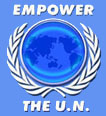 |
United Nations News | World News | World News - Africa | World News - South America Upcoming Events | People's Assembly Movement | Links / Resources | Peace, Culture & Education Articles | Women & Youth | Actions and Organizations | What People are Saying A project of Citizens for a United Nations People's Assembly - Contact |
|
Martti Ahtisaari, the Finish mediator for the United Nations on Kosovo, withheld his suggestions for the next steps in Kosovo until after the late January elections in Serbia. As the status of Kosovo, still part of Serbia but functioning as a UN protectorate since the end of the 1999 war, is a hot political issue in Serbia, much of the electoral debate would have centered on Ahtisaari's suggestions. Now, the Serbian elections have been held although a coalition government has not yet been formed. However, the democratic, EU-oriented political parties have a two-thirds majority in the new Parliament. While the leaders of the two major democratic parties do not like each other as persons, their political outlook is close, and a coalition government should be formed quickly. Ahtisaari's suggestions, which will have to be debated and voted upon by the UN Security Council, call for "supervised independence". Kosovo's ethnic Albanian majority insists on independence. Already in 1991, the vast majority of Kosovars voted for independence in unofficial elections organized by the parallel governmental structures created by the Gandhian-influenced Kosovar leader Ibrahim Rugova. However, today, Kosovo state guarantees for its minority Serb population are likely to be ineffective without continued UN or EU supervision. Since the death on 21 January 2006 of the Kosovo President Ibrahim Rugova, there has been no leadership in Kosovo devoted to non-violence and a broad spirit of compromise. Even under UN supervision, Kosovo is weakened by corruption, crime and violence. However, the UN has limited patience to keep administering Kosovo and limited power to fight corruption and crime. Lack of economic prospects is feeding narrow Albanian nationalism, and until Kosovo's legal status is settled, anger and violence remain close to the surface. Currently, Kosovo's major export is its young, unemployed people. No country can be expected to mature positively and to grow in an international no-man's land. The new status of Kosovo will have an impact on the wider area. Some political leaders in Serbia and Bosnia-Herzegovina see the Kosovo precedent used to demand a break-up of Bosnia-Herzegovina with Bosnia's Serb Republic united with neighboring Serbia. President Vladimir Putin of Russia has warned that Kosovo would serve as a precedent for the Caucasus saying "If someone believes that Kosovo should be granted full independence as a state, then why should we deny it to the Abkhaz and the South Ossetians." The issue of what has been called "The Phantom Republics": Abkhazia, South Ossetia, Transnistria, Nagorno-Karabakh, Chechenya, and Kosovo are of importance to all of Europe. Each situation is separate and different, but all result from the break up of the federal states of the USSR and Yugoslavia. Each poses the question of the "rights of peoples". Each of these "phantom republics" has carved out a de facto existence with the symbols of a state: a president, a parliament, and a militia. Negotiations carried out by the Organization for Security and Co-operation in Europe or the UN have resulted in "frozen conflicts" but no settlement. Kosovo's future may be set by the UN's Security Council and for the moment Russian troops have kept Chechenya as part of the Russian Federation. Negotiations on the status of the other "phantom republics " do not seem to be moving in a creative direction, leaving these republics in difficult economic situations and with authoritarian leaders. One of our tasks is to look closely at each situation, to see what independent civil society groups exist and to encourage political creativity so that stable and just societies can develop. |
 |
United Nations News | World News | World News - Africa | World News - South America Upcoming Events | People's Assembly Movement | Links / Resources | Peace, Culture & Education Articles | Women & Youth | Actions and Organizations | What People are Saying A project of Citizens for a United Nations People's Assembly - Contact |